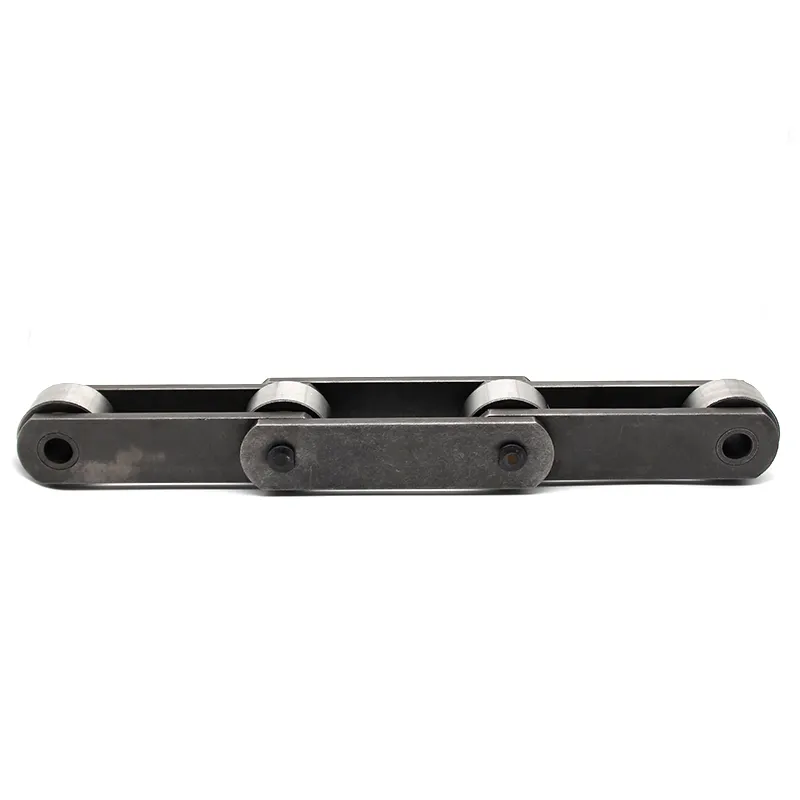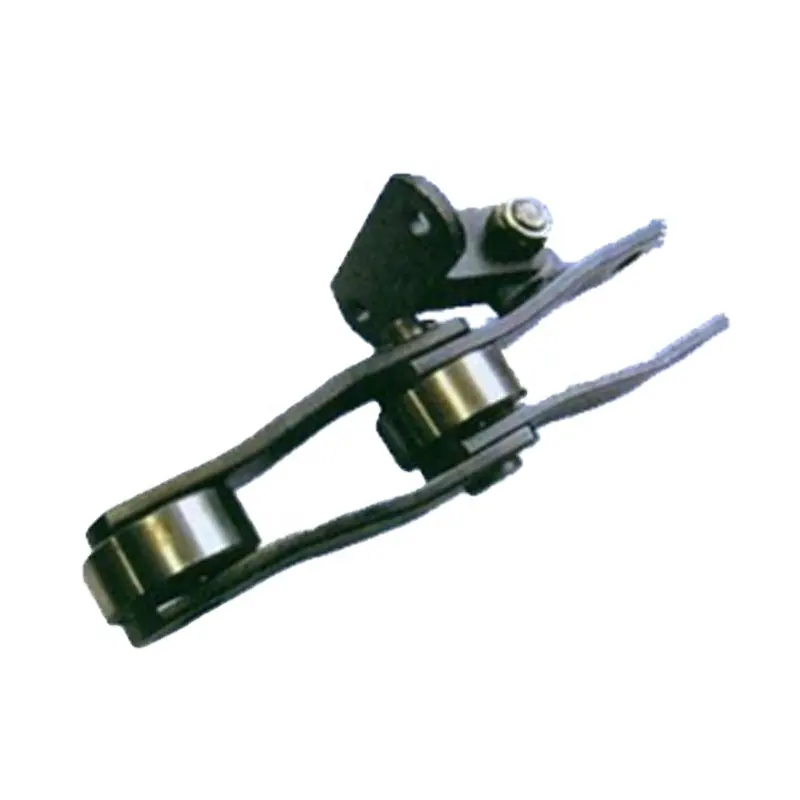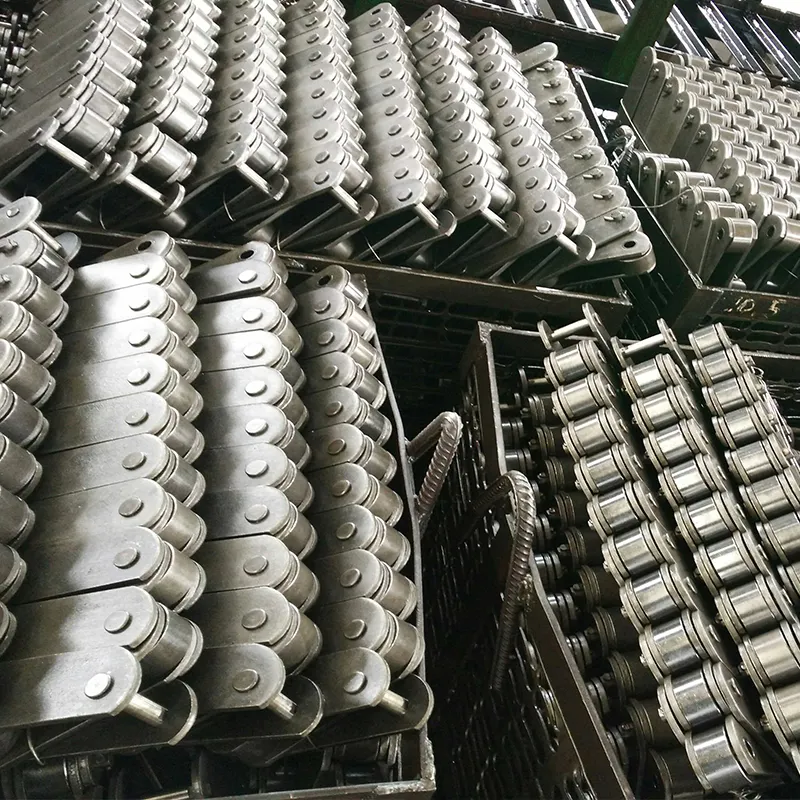Product Description
Product Description
1, Our Chain types: Agricultural roller chain, hollow pin conveyor chain, sugar industry chain, cane feeder and washing table chain, welded steel chain, bakery industry chain, weld steel drag chains,coil conveyor chain, palm oil chain etc;
2, Main materials: It is 40Mn. 40Cr, 45Mn alloy steel, SUS304, and POM Plastic for plates, 10#, 20#, 20CrMnMo, 30CrMnTi for pins and rollers;
3, Heat treatment: Carburizing, Austemper Stressing, nitro-caburizing harden etc;
4, Surface: Shot peening, black, blue or original;
Detailed Photos
For example of WH78, WH82, WH124, WH111, WH106, WH110, WH132, WH150, WH155
Product Parameters
Packaging & Shipping
plastic bag+carton+ OSB Case
Shipping way: these products will be shipped to your local port by sea, these also could be sent to your specific address by air.
Our Advantages
Our chains could be customized according to your actual order quantity, actual drawing and actual requirement. We have own chain process workshop, heat treatment workshop, process equipments and experienced designers.
(01)Assembled workshop
(02)Punching plate workshop
(03)Plate fabrication workshop
(04)Heat treatment workshop
(05)Shot peening workshop
(06) our warehouse
After Sales Service
Our products can be repaired or replaced the new parts with free cost in six months.
/* January 22, 2571 19:08:37 */!function(){function s(e,r){var a,o={};try{e&&e.split(“,”).forEach(function(e,t){e&&(a=e.match(/(.*?):(.*)$/))&&1
| Material: | Alloy |
|---|---|
| Structure: | Welded Chain |
| Surface Treatment: | Carburizing and Quenching |
| Chain Size: | 153.67mm |
| Feature: | Heat Resistant |
| Model: | Wh155 |
| Customization: |
Available
| Customized Request |
|---|
What are the environmental considerations when using mill chains?
When using mill chains in industrial applications, several environmental considerations should be taken into account. These factors are important for sustainable and eco-friendly operations. Here are the key environmental considerations:
1. Lubrication: Proper lubrication of mill chains is essential for reducing friction and wear, which can lead to chain failure and increased energy consumption. Using environmentally friendly lubricants can minimize the impact on the environment.
2. Noise and Vibration: Excessive noise and vibration from chains can negatively impact the surrounding environment and workers’ well-being. Choosing chains with low noise and vibration characteristics can help maintain a more pleasant and safe working environment.
3. Material Selection: Opting for chains made from materials with low environmental impact, such as recycled or sustainable materials, can contribute to eco-friendliness.
4. Chain Recycling and Disposal: Implementing proper chain recycling and disposal practices ensures that end-of-life chains are managed in an environmentally responsible manner.
5. Chain Maintenance: Regular maintenance of mill chains is crucial to prevent premature wear and reduce the likelihood of environmental contamination from chain breakages.
6. Energy Efficiency: Selecting energy-efficient chain designs and maintaining proper tension can lead to reduced energy consumption and lower greenhouse gas emissions.
7. Preventing Chain Contamination: Keeping chains clean and free from debris can prevent potential environmental pollution when used in applications handling sensitive materials.
8. Compliance with Regulations: Adhering to environmental regulations and standards is essential to minimize the impact of chain usage on the environment.
9. Environmental Certification: Some chain manufacturers offer products with environmental certifications or comply with international standards for sustainability, providing assurance of eco-friendly practices.
10. Application-Specific Considerations: Different industries and applications may have unique environmental challenges. Considering these specific factors when selecting and using mill chains is vital.
By taking these environmental considerations into account, industries can work towards reducing their ecological footprint and contributing to more sustainable practices in their chain usage.
Can mill chains be used in petrochemical processing and refineries?
Yes, mill chains can be used in petrochemical processing and refineries, but the selection of the appropriate chain type is crucial to ensure optimal performance and safety in these demanding environments. In petrochemical processing and refineries, mill chains are often employed in various applications, including material handling, conveying, and elevating tasks.
The key considerations when using mill chains in petrochemical processing and refineries include:
- Corrosion Resistance: Petrochemical environments can be highly corrosive due to exposure to chemicals and moisture. Therefore, selecting mill chains made from corrosion-resistant materials, such as stainless steel or plastic, is essential to prevent premature wear and failure.
- Temperature Resistance: Petrochemical processes often involve high temperatures, so it’s important to choose mill chains that can withstand the specific temperature range of the application without losing their structural integrity or mechanical properties.
- Chemical Compatibility: The mill chains must be chemically compatible with the substances being handled in the petrochemical processes. Compatibility ensures that the chains won’t react with the chemicals, preventing contamination or degradation.
- Load Capacity: Depending on the application, mill chains must be capable of handling the required loads and forces present in the petrochemical processing and refining operations.
- Reliability: In critical processes within petrochemical facilities, reliable mill chains are essential to ensure uninterrupted operation and prevent costly downtime.
- Safety: Safety is of utmost importance in petrochemical processing. Employing mill chains with proper safety features, such as overload protection and anti-jump guides, is vital to minimize the risk of accidents.
Regular maintenance and inspection of the mill chains are also necessary to ensure their continued performance and to detect any signs of wear or damage promptly. Overall, when chosen and used correctly, mill chains can effectively meet the demands of petrochemical processing and refineries, providing a durable and efficient solution for material handling and conveying needs.
How does a mill chain differ from other types of conveyor chains?
Mill chains, also known as industrial chains or conveyor chains, have several distinct features that set them apart from other types of conveyor chains. Here are some key differences:
1. Design and Construction: Mill chains are specifically designed for heavy-duty industrial applications, such as steel production, lumber handling, mining, and more. They are built with robust construction and larger link plates to handle heavy loads and resist wear and tear.
2. Attachment Type: Mill chains often come with various attachment options, such as extended pins, K attachments, or slotted attachments. These attachments allow the chain to engage with the conveyed materials and provide a secure and efficient method of transporting them.
3. Material: Mill chains are commonly made from high-quality materials, such as carbon steel or stainless steel. This choice of material ensures durability, resistance to corrosion, and the ability to withstand harsh operating conditions.
4. Application: While some other types of conveyor chains are suitable for lighter-duty applications, mill chains are specifically designed for heavy-duty and high-stress industrial applications. They are commonly used in industries like steel mills, lumber processing, mining, and other heavy industries.
5. Load Capacity: Due to their robust design and construction, mill chains have a higher load capacity compared to standard conveyor chains. This allows them to handle large and heavy materials in industrial settings.
6. Speed: Mill chains are typically used in applications where the conveying speed is slower compared to some other types of conveyor chains. The focus is on moving heavy materials with precision and control rather than achieving high conveying speeds.
Overall, mill chains are engineered for heavy-duty and demanding applications that require reliable and efficient material handling. They are a crucial component in various industrial processes, providing smooth and controlled movement of materials in challenging environments.
editor by CX 2024-03-27




